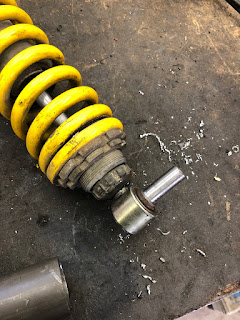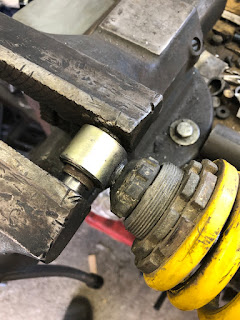Knuth... sounds German, right? Well, this fine young lady is actually of Taiwanese origin and aside from it's German designation Knuth FF-20, it is generally better known as a 6x26-mill. I had been on the lookout for one of these for quite a while, but as they never were as popular as other models, they came up rather rarely on the second hand market and new they were much to expensive for what they actually are.
As can be seen, Knuth is fresh from the factory... but she left said factory 16 or 17 years ago and was patiently sitting in a German garage for all those years, waiting for me. The protective wax over the course of time has turned into a sticky gooey substance, which was rather unpleasant to work with, but mostly protected all the metal parts.
In order to get it onto the stand (and to clean it) it had to be taken apart, which lead to the only (prolonged) head-scratching moment during the whole disassembly and later re-assembly.
This bit of contact rust was pretty much the only bit, where rust had formed and after a bit of scotchbrite-massage, all that was left of it was a slightly darker spot on the ways.
With the table and knee removed, the base casting can be split once more as the column is held on with four M16 bolts and while not exactly "LIGHT", with a willing helper they are totally manageable.
I re-used the stand of my old RF-25 mill as it was about the right size, aside from having to drill 4 new holes it was a rather close fit.
But once the knee was installed, the drama started: about half way down it would start to bind up terribly.
So at first I did what any good engineer would do, I checked the adjustment-gib for straightness and it was closer to a mechanical banana than anything else. Gib: checked.
What I did not expect was a spindle nut, which wasn't milled flat and would only work in one position. (Now marked as can be seen below.)
As I am not going with 3-phase, the 0.75kW motor had to swap places with a 1.5kW single-phase motor with a 19mm shaft and a 125x100 bolt pattern. (I have the nagging suspicion that this info will come in handy at some point...)
And there she is in all her glory - and as the diligent obverserver will have noticed, the stand has been lowered to around 60cm from the floor as the RF-25 stand was just too tall for me.
So what she's like to work with? I honestly can't tell you yet, as I haven't wired her up, but I can tell you, she's quite a different beast compared to the old mill.
Aside from getting her going at all, one of the first modifications will probably be to install a riser block between head and column to get some extra room in the Z-direction and to the great surprise of many, I actually have bought a (very basic) DRO, which at some point I will definitely install. (At least this one has got proper metric dials...)































